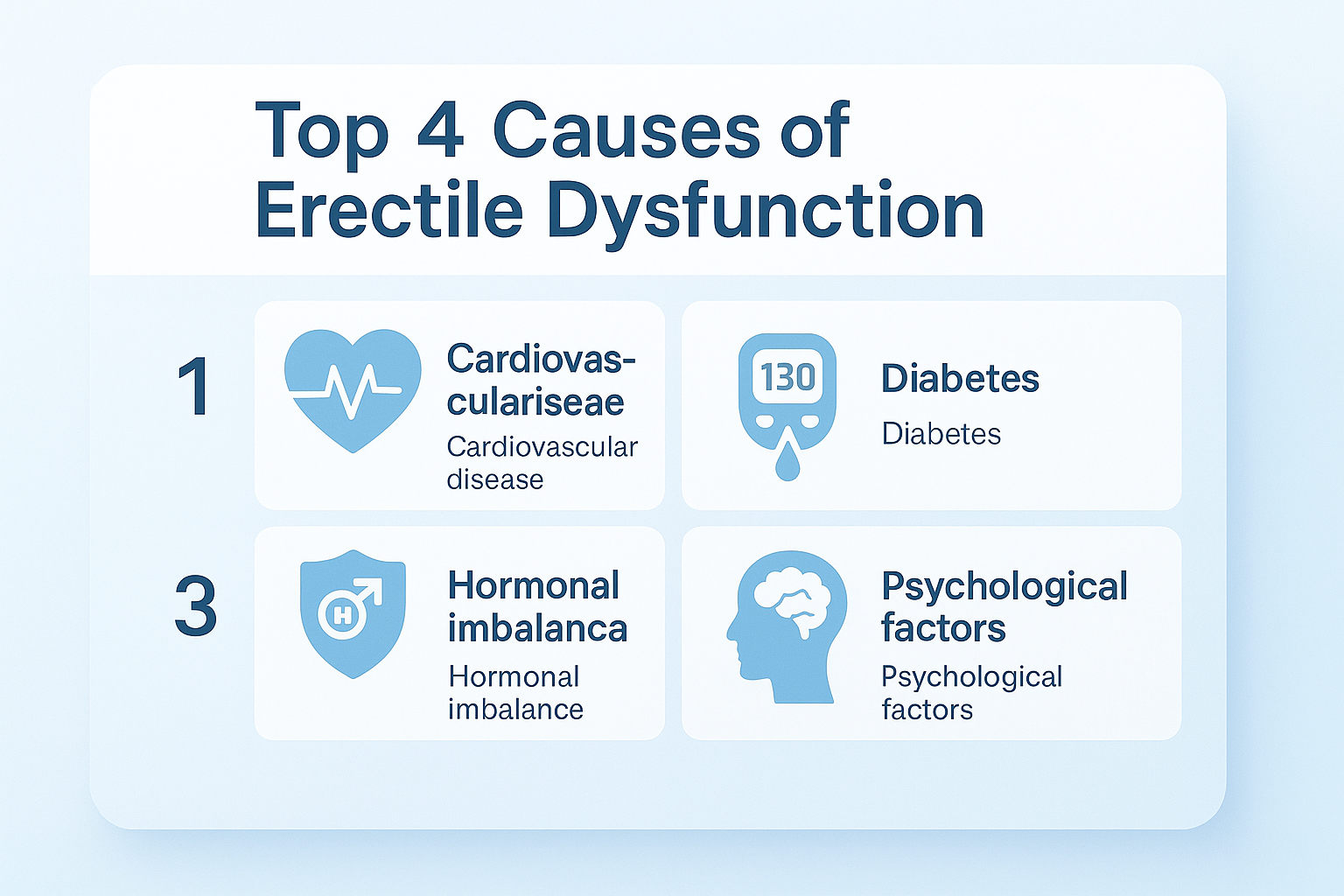The Top 4 Causes of Erectile Dysfunction (ED)

Erectile dysfunction (ED) is one of the most common men’s health concerns, affecting millions of men in the U.S. each year. While it’s often treated with a “quick fix” like a pill, ED is rarely just about performance—it’s usually a symptom of an underlying health problem.
At Sheen Vein (Aesthetics and Functional Medicine) in St. Louis, we take a different approach. We see ED as an opportunity to look deeper into your overall health. By identifying and addressing the root cause, we don’t just restore sexual function—we improve long-term wellness.
Here are the top 4 causes of ED we see most often in our clinic.
1. Vascular (Blood Flow) Problems
An erection depends on healthy blood flow to the penis. When blood vessels are narrowed, stiff, or damaged, it becomes difficult to achieve or maintain an erection.
Common vascular causes of ED include:
- Atherosclerosis: Plaque buildup in the arteries, often linked to high cholesterol, hypertension, and poor diet.
- Endothelial dysfunction: The inner lining of blood vessels (endothelium) can’t produce enough nitric oxide, a molecule that relaxes blood vessels and allows for increased blood flow.
- Venous leak: Blood enters the penis but doesn’t stay there due to poor vein function.
Why this matters: Vascular ED can be an early warning sign of cardiovascular disease. Studies show that men with ED often develop heart problems within 3–5 years if the underlying vascular issue isn’t addressed.
Functional medicine approach: We measure cardiovascular and endothelial health, optimize nitric oxide production, and address circulation with nutrition, lifestyle changes, and, when needed, in-office therapies like acoustic wave therapy or red light therapy to improve blood vessel function.
2. Hormonal Imbalances
Testosterone plays an important role in sexual desire and function. But ED can also be affected by other hormones, including thyroid hormones, cortisol, and prolactin.
Common hormonal causes of ED:
- Low testosterone: Reduces libido and erectile quality.
- High estrogen in men: Can result from obesity, poor liver detoxification, or excessive aromatization of testosterone.
- Thyroid disorders: Both hypo- and hyperthyroidism can impair sexual function.
- High cortisol: Chronic stress and adrenal dysregulation can blunt sexual desire.
Functional medicine approach: We run comprehensive hormone panels—not just testosterone—to assess the full hormonal picture. Treatment may include testosterone optimization, adrenal support, thyroid correction, and lifestyle changes that restore hormone balance naturally.
3. Neurological Causes
The brain, spinal cord, and peripheral nerves all play a role in initiating and maintaining erections. Damage to these systems can disrupt the nerve signals necessary for arousal.
Common neurological causes of ED:
- Diabetic neuropathy: Nerve damage from high blood sugar.
- Spinal cord injury: Trauma or surgery affecting pelvic nerve pathways.
- Multiple sclerosis or Parkinson’s disease: Neurological conditions that interfere with sexual signaling.
- Pelvic surgery: Prostate or bladder surgery can damage erectile nerves.
Functional medicine approach: We focus on controlling underlying conditions (like diabetes), improving nerve health through targeted nutrients (such as alpha-lipoic acid, B vitamins, and omega-3s), and using regenerative therapies when possible to promote nerve repair.
4. Psychological & Lifestyle Factors
While physical causes are common, psychological and lifestyle factors can also play a major role in ED. Performance anxiety, depression, and chronic stress can disrupt sexual function—even in men with healthy cardiovascular and hormonal systems.
Contributing factors include:
- Chronic stress: Raises cortisol, which reduces testosterone and sexual drive.
- Anxiety or depression: Can interfere with arousal and confidence.
- Poor sleep: Lowers testosterone production and increases inflammation.
- Substance use: Excessive alcohol, recreational drugs, and smoking damage blood vessels and nerve function.
Functional medicine approach: We combine stress management tools, sleep optimization, and mental health support with physical interventions to address ED from all angles.
Why Identifying the Cause Matters
ED is not just about sexual performance—it’s often the first sign that something deeper is wrong. In fact, ED can be an early warning for:
- Heart disease
- Metabolic syndrome
- Diabetes
- Hormonal decline
- Neurological conditions
Addressing the root cause can improve not just sexual health, but also longevity, energy, and overall quality of life.
Bottom Line
The top 4 causes of ED—vascular problems, hormonal imbalances, neurological issues, and psychological/lifestyle factors—often overlap. That’s why a one-size-fits-all approach doesn’t work.
At Sheen Vein (Aesthetics and Functional Medicine), we offer a comprehensive evaluation that includes advanced blood work, vascular testing, and hormone analysis to identify the root cause of ED. From there, we create a personalized treatment plan that may include:
- Nutritional and lifestyle interventions
- Hormone optimization
- Circulation-enhancing therapies
- Stress and sleep support
- Regenerative medicine options
Our goal isn’t just to restore function—it’s to help you reclaim confidence, intimacy, and overall health.
Struggling with ED?
We offer discreet, results-driven care in St. Louis and via telemedicine for Missouri residents.
Learn more about our Men’s Health services »
Schedule your consultation today »